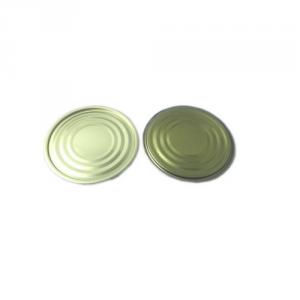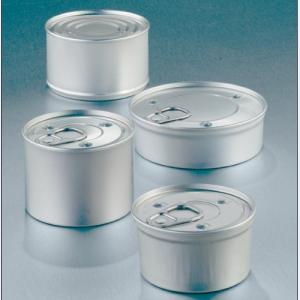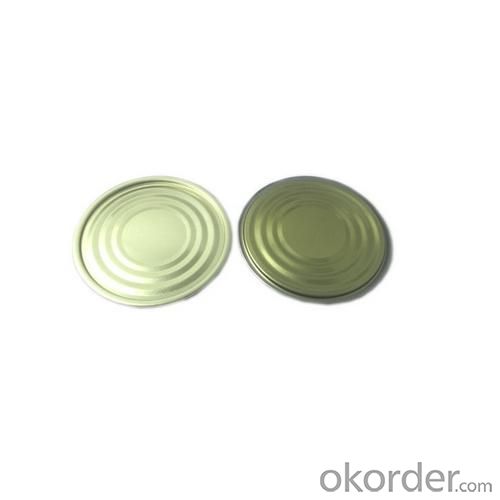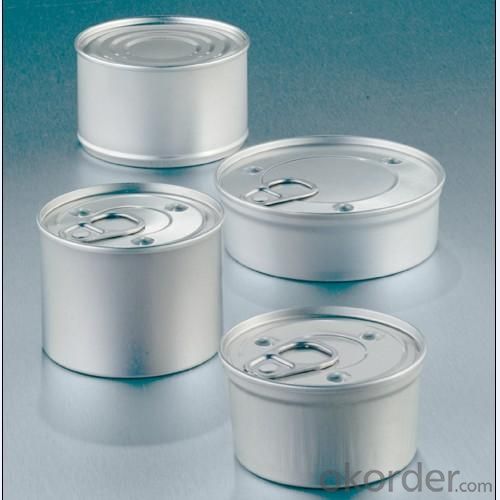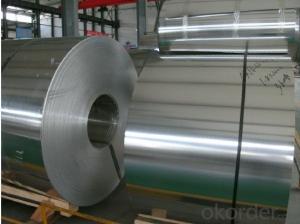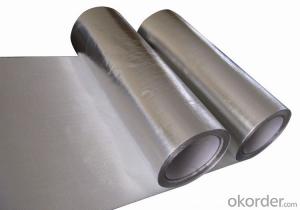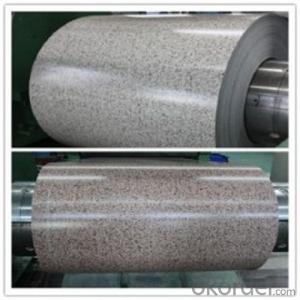Can End/Tab Stock
- Loading Port:
- China Main Port
- Payment Terms:
- TT or L/C
- Min Order Qty:
- 10 Tons m.t.
- Supply Capability:
- 8000 Tons Per Month m.t./month
OKorder Service Pledge
OKorder Financial Service
You Might Also Like
1.General Information of Can End/Tab Stock
CAN END/TAB STOCK is between 0.235 mm and 0.355mm in thickness with clear paint or golden color paint. Paint is usually from VALSPAR OR PPG and lubrication can be done.
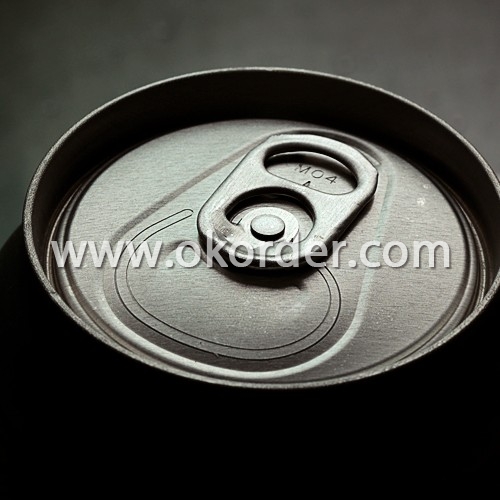
2.Features of Can End/Tab Stock:
CNBM produces aluminum coils which meets the highest standards in its own mill while save the cost. Our strong quality control term bring you the most-qualified products. And with state-of-the-art equipment, and the state owned company background, we have to say, you will understand why there are so many company choose CNBM to be their supplier. CNBM aluminum complying with YS/T 429-2000(Chinese Industry Standard),GB/T 3880,EN485,ASTM B209.
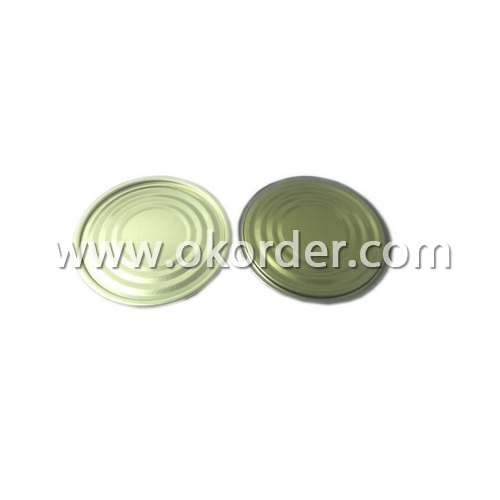
3.The main producing procedure of Can End/Tab Stock:
Rolling--Annealing--Slitting—Rinsing—Coating—Baking---Coiling
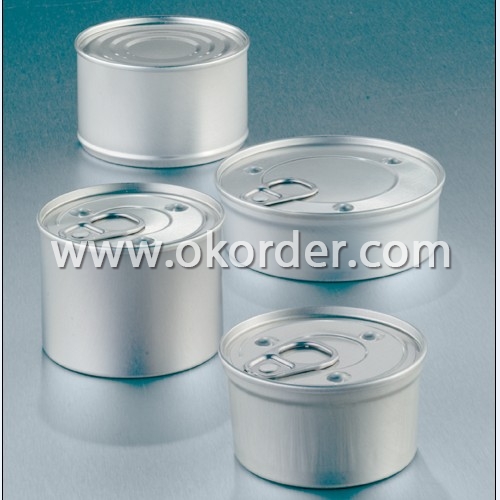
4. Specification of Can End/Tab Stock
Alloy | AA5052, AA5182, AA3004, AA3104 |
Temper: | H19,H48 |
Thickness: | 0.235-0.355mm |
Width: | 700mm- 1800mm |
Standard: | GB/T17748-1999, ASTM, ISO, EU standard |
Special Specification is available on customer’s requirement | |
- Q: Can aluminum coils be used in the manufacturing of lighting fixtures?
- Yes, aluminum coils can be used in the manufacturing of lighting fixtures. Aluminum is a versatile and lightweight material that has excellent thermal conductivity properties, making it suitable for dissipating heat generated by the light source. Additionally, aluminum coils are easily moldable, allowing for the creation of intricate designs and shapes in lighting fixtures. The corrosion-resistant nature of aluminum also ensures the longevity and durability of the lighting fixture. Overall, aluminum coils are a popular choice in the manufacturing of lighting fixtures due to their numerous advantages.
- Q: What are the common surface treatments for aluminum coils in the automotive industry?
- Aluminum coils in the automotive industry undergo various surface treatments to improve their performance and appearance. Some popular treatments include anodizing, painting, cladding, clear coating, and polishing/buffing. Anodizing is a widely used treatment that forms a protective oxide layer on the surface of the coils. This is achieved by immersing the coils in an electrolytic solution and applying an electric current. Anodizing enhances corrosion resistance, durability, and allows for dye or paint application. Painting is another option for aluminum coil treatment, providing both aesthetics and protection against environmental factors. Coils are coated with either solvent-based or powder paint, offering an appealing appearance and safeguarding against scratches and UV radiation. Cladding involves bonding a layer of aluminum alloy with different properties onto the coil's surface. This treatment is commonly employed to enhance strength, thermal conductivity, or corrosion resistance. Cladding methods can include hot rolling, cold rolling, or explosive bonding. Clear coating is often applied to aluminum coils to create a transparent protective layer. This coating prevents corrosion, oxidation, and discoloration, while preserving the natural metallic appearance. Polishing and buffing are surface treatments that aim to improve the smoothness and shine of aluminum coils. Imperfections, scratches, and oxidation are mechanically removed through grinding or polishing. These methods are often used for decorative purposes in high-end automotive applications. These are merely a few examples of the surface treatments available for aluminum coils in the automotive industry. The choice of treatment depends on factors such as desired appearance, performance requirements, and environmental conditions the coils will face.
- Q: Can aluminum coils be used for decorative purposes?
- Aluminum coils offer a multitude of possibilities when it comes to decoration. This versatile material can be easily molded and adjusted, making it ideal for a wide range of decorative uses. In industries like architecture, interior design, and automotive design, aluminum coils are frequently employed to create decorative trims, accents, and borders. To further enhance their visual appeal and match the desired aesthetic, these coils can be painted or coated with different finishes. Moreover, thanks to their lightweight nature and durability, aluminum coils are a popular choice for outdoor decorative purposes, such as garden ornaments, sculptures, and signage. Ultimately, incorporating aluminum coils into various projects provides a cost-effective and visually pleasing solution for adding decorative elements.
- Q: What are the potential applications of coil-coated aluminum coils?
- Coil-coated aluminum coils have a wide range of potential applications due to their versatility and durability. Some common applications include roofing and cladding for buildings, automotive parts, signage, electronics, and appliances. The coil coating process enhances the aluminum's resistance to corrosion, weathering, and fading, making it suitable for both indoor and outdoor uses. Additionally, the ability to apply various colors and finishes to the coils allows for customization and aesthetic appeal in different industries.
- Q: Can aluminum coils be used in the production of aluminum composite windows?
- Indeed, it is possible to utilize aluminum coils for the creation of aluminum composite windows. The manufacturing process of aluminum composite windows frequently involves the utilization of aluminum coils. These coils are crafted from top-notch aluminum and are commonly employed as the primary material that is subsequently molded and fashioned into the desired window frames and components. Aluminum coils present numerous benefits in the production of aluminum composite windows, such as their lightweight properties, robustness, and ability to withstand corrosion. These characteristics render aluminum coils an apt selection for manufacturers seeking to fabricate aluminum composite windows that are both of superior quality and possess extended durability.
- Q: Are aluminum coils suitable for signage systems?
- Yes, aluminum coils are highly suitable for signage systems. They are lightweight, durable, and weather-resistant, making them ideal for both indoor and outdoor signage. Aluminum coils can be easily shaped and molded into various designs and sizes, providing flexibility in creating custom signage solutions. Additionally, aluminum coils offer excellent corrosion resistance and can withstand harsh environmental conditions, ensuring long-lasting and visually appealing signage.
- Q: Can aluminum coils be used in electrical transmission systems?
- Yes, aluminum coils can be used in electrical transmission systems. Aluminum is a commonly used material in electrical transmission systems due to its favorable electrical conductivity, high strength-to-weight ratio, and cost-effectiveness compared to other materials such as copper. Aluminum coils are used in transformers, motors, generators, and other electrical devices. Additionally, aluminum coils are lightweight, which makes them easier to handle and install in transmission systems. However, it is important to consider that aluminum has a lower electrical conductivity than copper, so larger cross-sectional areas may be required to achieve the same electrical performance. Proper design and engineering practices should be followed to ensure that aluminum coils are appropriately sized and connected in electrical transmission systems to maintain efficiency, reliability, and safety.
- Q: Are aluminum coils fire-resistant?
- Aluminum coils possess fire-resistant qualities due to their high melting point of 660 degrees Celsius (1220 degrees Fahrenheit) and their inability to burn, rendering them non-combustible. This specific characteristic allows for the utilization of aluminum coils in various applications, particularly in sectors where fire resistance is of utmost importance, such as building construction, electrical wiring, and HVAC systems. Moreover, the remarkable heat conductivity of aluminum facilitates rapid heat dissipation, thereby minimizing the risk of fire incidents. Nevertheless, it is crucial to acknowledge that although aluminum coils themselves exhibit fire-resistant properties, they may be incorporated into systems alongside other components that might not share the same level of fire resistance. Consequently, it is essential to consider the entirety of the system and adhere to proper fire safety regulations and guidelines to ensure comprehensive fire safety precautions.
- Q: What is the typical lead time for manufacturing aluminum coils?
- The typical lead time for manufacturing aluminum coils can vary depending on several factors such as the specific requirements of the order, the complexity of the manufacturing process, and the current demand and capacity of the manufacturer. In general, lead times for aluminum coil production can range from a few weeks to several months. For standard aluminum coil orders, where the specifications and quantities are within the manufacturer's regular production capabilities, the lead time is usually shorter and can be around 4-8 weeks. This includes the time required for raw material sourcing, processing, and quality control checks. However, for custom or specialized aluminum coil orders that require specific dimensions, finishes, or additional processing steps such as coating or embossing, the lead time can be longer. These types of orders may require additional time for design and engineering, tooling setup, and testing, which can extend the lead time to approximately 8-12 weeks or more. It is important to note that lead times can also be influenced by external factors such as the availability of raw materials, transportation delays, or unforeseen production issues. Therefore, it is always advisable to communicate with the manufacturer to get an accurate estimate of the lead time for specific aluminum coil orders.
- Q: How do aluminum coils compare to galvanized steel coils in terms of longevity?
- Aluminum coils generally have a longer lifespan compared to galvanized steel coils. This is because aluminum is naturally corrosion-resistant, providing better protection against rust and other environmental factors. Additionally, aluminum coils are less prone to damage caused by scratches or dents, further contributing to their longevity. However, the specific lifespan of both types of coils can vary depending on the quality of materials used and the maintenance practices followed.
1. Manufacturer Overview
| Location | Henan, China |
| Year Established | 1996 |
| Annual Output Value | Above US$200 Million |
| Main Markets | Mid East;Eastern Europe;North America |
| Company Certifications | ISO 9001:2000;ISO 14001:2004;OHSAS 18001 |
2. Manufacturer Certificates
| a) Certification Name | |
| Range | |
| Reference | |
| Validity Period |
3. Manufacturer Capability
| a) Trade Capacity | |
| Nearest Port | Shanghai |
| Export Percentage | 30%-50% |
| No.of Employees in Trade Department | 21-50 People |
| Language Spoken: | English;Chinese |
| b) Factory Information | |
| Factory Size: | Above 100,000 square meters |
| No. of Production Lines | Above 10 |
| Contract Manufacturing | OEM Service Offered;Design Service Offered |
| Product Price Range | Average |
Send your message to us
Can End/Tab Stock
- Loading Port:
- China Main Port
- Payment Terms:
- TT or L/C
- Min Order Qty:
- 10 Tons m.t.
- Supply Capability:
- 8000 Tons Per Month m.t./month
OKorder Service Pledge
OKorder Financial Service
Similar products
Hot products
Hot Searches
Related keywords

